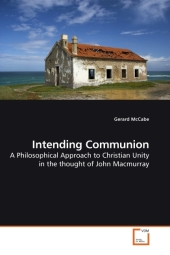 Neuerscheinungen 2010Stand: 2020-01-07 |
Schnellsuche
ISBN/Stichwort/Autor
|
Herderstraße 10
10625 Berlin
Tel.: 030 315 714 16
Fax 030 315 714 14
info@buchspektrum.de |

Gerard McCabe
Intending Communion
A Philosophical Approach to Christian Unity in the thought of John Macmurray
2010. 228 S.
Verlag/Jahr: VDM VERLAG DR. MÜLLER 2010
ISBN: 3-639-24445-1 (3639244451)
Neue ISBN: 978-3-639-24445-8 (9783639244458)
Preis und Lieferzeit: Bitte klicken
The topic of Christian unity has become a central issue for all of the Christian Churches. However something which has been largely overlooked in the whole ecumenical question is the need for an appropriate philosophical basis for unity among peoples and among the Churches. Without such a philosophical underpinning, the call to unity can easily be seen as simply a practical pastoral tool for the effective proclamation of the Gospel or as nothing other than emotive rhetoric. In the writings of the Scottish philosopher, John Macmurray we find an approach to ecumenism that provides us with just such a philosophical basis for unity. As both a philosopher and a Christian, Macmurray spent his life attempting to show that we are called to a life of unity with one another. He claims that to be properly human is to seek and to intend communion with others, and in his analysis of the nature of the human person he offers us a way of understanding that the call to Christian unity is not simply a matter of pastoral effectiveness but one that expresses the deepest truth of our human being, that we are most fully ourselves when we are in communion with one another.
Gerard McCabe is a lecturer in Philosophy at St Augustine College of South Africa in Johannesburg. He is also a Catholic priest and a member of the Redemptorist Congregation.


